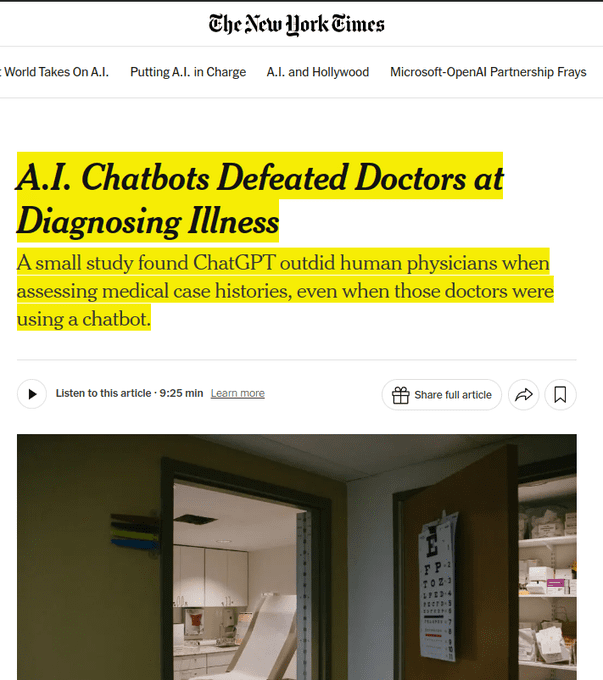ChatGPT: A New Frontier in Medical Diagnosis
In a groundbreaking study, researchers have found that ChatGPT, an advanced AI language model developed by OpenAI, can perform medical diagnosis with a higher accuracy rate than human doctors. The study, which involved 50 physicians analyzing six challenging clinical cases, revealed that ChatGPT alone scored an impressive 90% in diagnosing medical conditions from case reports. This performance significantly outperformed both groups of human physicians, who scored 76% when using ChatGPT and 74% without it.
The study’s findings highlight the potential of AI in revolutionizing the healthcare industry, particularly in the field of diagnostics. However, the researchers emphasized that teaching doctors to use ChatGPT effectively is crucial to harnessing its full potential. Most doctors in the study treated ChatGPT like a search engine rather than leveraging its full diagnostic capabilities, which resulted in only a slight improvement in their diagnostic accuracy when using the AI tool.
For more details on the study, you can read the full article on ChatGPT asked to answer medical questions. Check results.
Challenges in Integrating AI into Medical Practice
Despite the promising results, the study also uncovered several challenges in integrating AI tools like ChatGPT into medical practice. One of the main issues was that many doctors did not effectively use ChatGPT, often treating it as a simple search engine. This misuse limited the AI’s potential to enhance diagnostic accuracy. Additionally, doctors frequently disregarded ChatGPT’s suggestions when they conflicted with their initial diagnoses, demonstrating a confirmation bias that could hinder the adoption of AI in clinical settings.
To address these challenges, the study developed a new structured reflection tool designed to evaluate diagnostic reasoning skills more comprehensively than traditional accuracy metrics. This tool aims to help doctors better understand and utilize AI recommendations, ultimately improving patient outcomes.
For more insights into the limitations of AI in healthcare, you can read the article on Including evidence in question confuses ChatGPT, lowers its accuracy: study.
Technical Implementation of the Study
The research employed a randomized clinical trial design with single-blind methodology to ensure the reliability of the results. The diagnostic performance was evaluated using a standardized rubric that measured differential diagnosis accuracy, supporting/opposing factors, and next steps. The assessment tool validation showed substantial inter-rater agreement with a weighted Cohen’s kappa (κ) of 0.66.
This study’s rigorous methodology underscores the robustness of ChatGPT’s diagnostic capabilities, even when analyzing clinical cases that were never previously published or included in its training data. This finding is particularly significant as it demonstrates the AI’s ability to generalize its knowledge to new and unseen cases.
For more information on the technical aspects of the study, visit OpenAI unveils new ChatGPT that can reason through math and science.
Implications for the Future of Healthcare
The implications of this study are far-reaching. The ability of ChatGPT to diagnose medical conditions with such high accuracy could potentially transform the healthcare industry. AI tools like ChatGPT could assist doctors in making more accurate diagnoses, reducing the risk of misdiagnosis and improving patient outcomes. However, the study also highlights the importance of proper training for doctors to effectively use these tools.
As AI continues to advance, it is crucial to address the ethical considerations and potential risks associated with its use in healthcare. Issues such as data privacy, the potential for bias in AI algorithms, and the need for regulatory oversight must be carefully managed to ensure the safe and effective deployment of AI in medical practice.
For further reading on the potential and challenges of AI in healthcare, check out AI-powered Regard nabs $61M to find missed illness, boost hospital revenue and How Abridge became one of the most talked about healthcare AI startups.
Related Articles
- Overcoming the Challenges of Using AI Chatbots in Healthcare
- SearchGPT vs. ChatGPT: Differences, Benefits, and Future
- Beyond ChatGPT: 7 AI Tools to Enhance Your Productivity
- Google’s New AI-Powered Documentation Tool for Healthcare
- ChatGPT Cheat Sheet for Job Seekers
Looking for Travel Inspiration?
Explore Textify’s AI membership
Need a Chart? Explore the world’s largest Charts database
